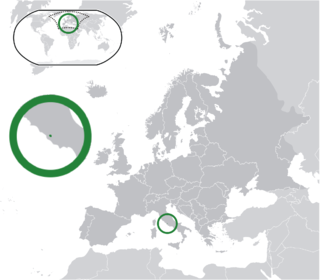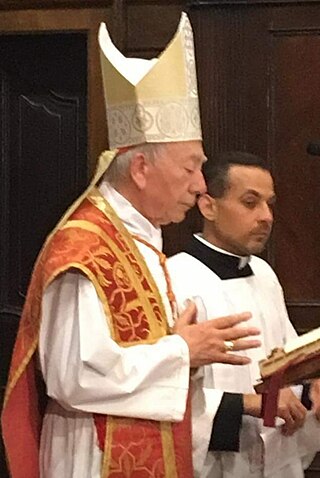Male and Female He Created Them: Toward a Path of Dialogue on the Question of Gender Theory in Education is a document of the Congregation for Catholic Education, published on June 10, 2019, under the prefect Cardinal Giuseppe Versaldi, during the pontificate of Pope Francis, that instructs Catholic schools to teach their students on how to dialogue with others about gender identity. [1]
The document builds on the apostolic exhortation Amoris laetitia (On Love in the Family), where Pope Francis says, "No one can think that the weakening of the family as that natural society founded on marriage will prove beneficial to society as a whole." [2] It rejects the idea that transgender people can be any gender beside what they are born as. Further it argues that allowing gender norms to change destabilizes the family and society, and that "gender theory" is contrary to the Catholic faith. [3]
"Gender theory", according to the Congregation, "speaks of" a "denaturalisation, that is a move away from nature and towards an absolute option for the decision of [...] feelings". [4] : 11 (italics in original). The document alleges that "such theories" can be "traced back to"
dualistic anthropology, separating body (reduced to the status of inert matter) from human will, which itself becomes an absolute that can manipulate the body as it pleases. [...]physicalism and voluntarism gives rise to relativism, in which everything that exists is of equal value and at the same time undifferentiated, without any real order or purpose. In all such theories,[...] one’s gender ends up being viewed as more important than being of male or female sex. The effect of this move is chiefly to create a cultural and ideological revolution driven by relativism, and secondarily a juridical revolution, since such beliefs claim specific rights for the individual and across society. (italics in original) [4]
The Congregation states that "gender theory" is "strictly sociological". [5] [4] : 7 The Congregation asserted a "distinction" between "the whole field of research on gender that the human sciences have undertaken" and "the ideology of gender". [5] [4] : 5
The document further states that "the ideas of “intersex” or “transgender” [...] [are] self-contradictory", and are associated with "only ‘provocative’ display against so-called ‘traditional frameworks’[ sic ]". [4] [lower-alpha 1] [5] [6]
The Congregation states that "only [...] reproductive technology", which is not a "replacement" of "natural conception" [lower-alpha 2] can "allow one of the partners in a relationship of two persons of the same sex to generate offspring", [4] : 15 and cannot "assure[...] the necessary conditions" for reproduction. [4] : 14
United States Conference of Catholic Bishops stated that the document "will serve as a solid framework for those engaged in the ministry of Catholic education". [7] Cindy Bourgeois, minister of Wesley United Church in Regina, Saskatchewan, wrote on CBC News that the document "denies the humanity of trans people, summarily dismisses entire academic fields and misrepresents science to fit its desired outcome." [8] Daniel Horan OFM stated that "the document at once claims a good-faith interest in conversation, while portending a dismissive monologue instead." [9]
Gender identity is the personal sense of one's own gender. Gender identity can correlate with a person's assigned sex or can differ from it. In most individuals, the various biological determinants of sex are congruent, and consistent with the individual's gender identity. Gender expression typically reflects a person's gender identity, but this is not always the case. While a person may express behaviors, attitudes, and appearances consistent with a particular gender role, such expression may not necessarily reflect their gender identity. The term gender identity was coined by psychiatry professor Robert J. Stoller in 1964 and popularized by the controversial psychologist John Money.

Pope Francis is the head of the Catholic Church, the bishop of Rome and sovereign of the Vatican City State. He is the first pope to be a member of the Society of Jesus (Jesuits), the first one from the Americas, the first one from the Southern Hemisphere, and the first one born or raised outside Europe since the 8th-century papacy of the Syrian Pope Gregory III.

Walter Kasper is a German Catholic cardinal and theologian. He is President Emeritus of the Pontifical Council for Promoting Christian Unity, having served as its president from 2001 to 2010.
The gender binary is the classification of gender into two distinct forms of masculine and feminine, whether by social system, cultural belief, or both simultaneously. Most cultures use a gender binary, having two genders.

The legal code regarding lesbian, gay, bisexual, and transgender (LGBT) rights in Vatican City is based on the Italian Zanardelli Code of 1889, since the founding of the sovereign state of the Vatican City in 1929.

Francesco Coccopalmerio is an Italian cardinal. He was president of the Pontifical Council for Legislative Texts from his appointment by Pope Benedict XVI on 15 February 2007 until his resignation was accepted by Pope Francis on 7 April 2018. He spent his early years in the Archdiocese of Milan and became an auxiliary bishop in 1993. He moved to the Roman Curia in 2000.

Willem Jacobus "Wim" Eijk is a Dutch prelate of the Catholic Church, a cardinal since 2012. He has been the Metropolitan Archbishop of Utrecht since 2007. He was Bishop of Groningen-Leeuwarden from 1999 to 2007. Before his clerical career he worked as a doctor; as a priest he made medical ethics the focus of his academic studies.
The relationship between transgender people and religion varies widely around the world. Religions range from condemning any gender variance to honoring transgender people as religious leaders. Views within a single religion can vary considerably, as can views between different faiths.

Sex and gender roles in the Roman Catholic Church have been the subject of both intrigue and controversy throughout the Church's history. The cultural influence of the Catholic Church has been vast, particularly upon Western society. Christian concepts, introduced into evangelized societies worldwide by the Church, had a significant impact on established cultural views of sex and gender roles. Human sacrifice, slavery, infanticide and polygamy practiced by cultures such as those of the Roman Empire, Europe, Latin America and parts of Africa came to an end through Church evangelization efforts. Historians note that Catholic missionaries, popes and religious were among the leaders in campaigns against slavery, an institution that has existed in almost every culture and often included sexual slavery of women. Christianity affected the status of women in evangelized cultures like the Roman Empire by condemning infanticide, divorce, incest, polygamy and marital infidelity of both men and women. Some critics say the Church and teachings by St. Paul, the Church Fathers, and scholastic theologians perpetuated a notion that female inferiority was divinely ordained, while current Church teaching considers women and men to be equal, different, and complementary.

Gerhard Ludwig Müller is a German cardinal of the Catholic Church. He served as the Cardinal-Prefect of the Congregation for the Doctrine of the Faith (CDF) from his appointment by Pope Benedict XVI in 2012 until 2017. Pope Francis elevated him to the rank of cardinal in 2014.

Within Christianity, there are a variety of views on the issues of gender identity and transgender people. Christian denominations vary in their official position: some explicitly support gender transition, some oppose it, and others are divided or have not taken an official stance. Within any given denomination, individual members may or may not endorse the official views of their church on the topic.
Amoris laetitia is a post-synodal apostolic exhortation by Pope Francis addressing the pastoral care of families. Dated 19 March 2016, it was released on 8 April 2016. It follows the Synods on the Family held in 2014 and 2015.

Multiple countries legally recognize non-binary or third gender classifications. These classifications are typically based on a person's gender identity. In some countries, such classifications may only be available to intersex people, born with sex characteristics that "do not fit the typical definitions for male or female bodies."
Correctio filialis de haeresibus propagatis is an August 11, 2017 petition initially by 62 critics of Pope Francis, who argued that the pope propagated heresies, with regard to seven theological issues the authors identified in Amoris laetitia, an apostolic exhortation by Pope Francis dated March 29, 2016, and in other related statements. The authors released the twenty-five page document to the public on September 24, 2017, stating they had received no response from the Holy See.

Víctor Manuel Fernández is an Argentine prelate of the Catholic Church and a theologian. He is currently the head of the Dicastery for the Doctrine of the Faith.
Gaudete et exsultate is the third apostolic exhortation of Pope Francis, dated 19 March 2018 and published on 9 April 2018, subtitled "on the call to holiness in today's world". It addresses the universal call to holiness, with a focus "to repropose the call to holiness in a practical way for our own time".

Pope Francis, the head of the Catholic Church since 2013, has marked a significantly more accommodative tone on LGBT topics than his predecessors. In July 2013, his televised "Who am I to judge?" statement was widely reported in the international press, becoming one of his most famous statements on LGBT people. In other public statements, Francis has emphasised the need to accept, welcome, and accompany LGBT people, including LGBT children, and has denounced laws criminalising homosexuality. While he has reiterated traditional Catholic teaching that marriage is between a man and a woman, he has supported same-sex civil unions as legal protections for same-sex couples. Under his pontificate, the Dicastery for the Doctrine of the Faith has confirmed that transgender people can be baptised, and allowed the blessing of same-sex couples in the document Fiducia supplicans. Francis has privately met many LGBT people and activists. In 2013, Francis was named as Person of the Year by The Advocate, an American LGBT magazine.
Praedicate evangelium is an apostolic constitution reforming the Roman Curia and was published and promulgated on 19 March 2022 by Pope Francis; the document took effect on 5 June 2022.

The Synodal Way was a series of conferences of the Catholic Church in Germany to discuss a range of contemporary religious, spiritual and theological and organizational questions concerning the Catholic Church, as well as gender issues and possible reactions to the sexual abuse crisis in the Catholic Church in Germany.
InterAction is a Swiss organization for intersex people, parents, friends and allies to educate, provide peer support and address human rights issues.